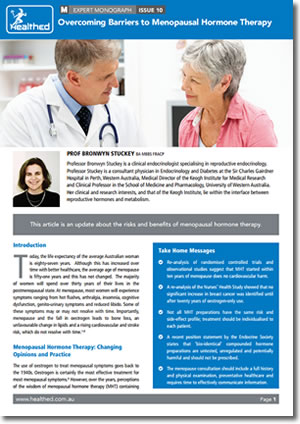Overcoming Barriers to Menopausal Hormone Therapy
Prof Bronwyn Stuckey BA MBBS FRACP
 Take Home Messages
Take Home Messages
- Re-analysis of randomised controlled trials and observational studies suggest that MHT started within ten years of menopause does no cardiovascular harm.
- A re-analysis of the Nurses’ Health Study showed that no significant increase in breast cancer was identified until after twenty years of oestrogen-only use.
- Not all MHT preparations have the same risk and side-effect profile; treatment should be individualised to each patient.
- A recent position statement by the Endocrine Society states that ‘bio-identical’ compounded hormone preparations are untested, unregulated and potentially harmful and should not be prescribed.
- The menopause consultation should include a full history and physical examination, preventative healthcare and requires time to effectively communicate information.
Introduction
Today, the life expectancy of the average Australian woman is eighty-seven years. Although this has increased over time with better healthcare, the average age of menopause is fifty-one years and this has not changed. The majority of women will spend over thirty years of their lives in the postmenopausal state. At menopause, most women will experience symptoms ranging from hot flushes, arthralgia, insomnia, cognitive dysfunction, genito-urinary symptoms and reduced libido. Some of these symptoms may or may not resolve with time. Importantly, menopause and the fall in oestrogen leads to bone loss, an unfavourable change in lipids and a rising cardiovascular and stroke risk, which do not resolve with time.
Download to see full mongraph.
![]() Overcoming Barriers to Menopausal Hormone Therapy7.88 MB
Overcoming Barriers to Menopausal Hormone Therapy7.88 MB
Content updated Febraury 2017
